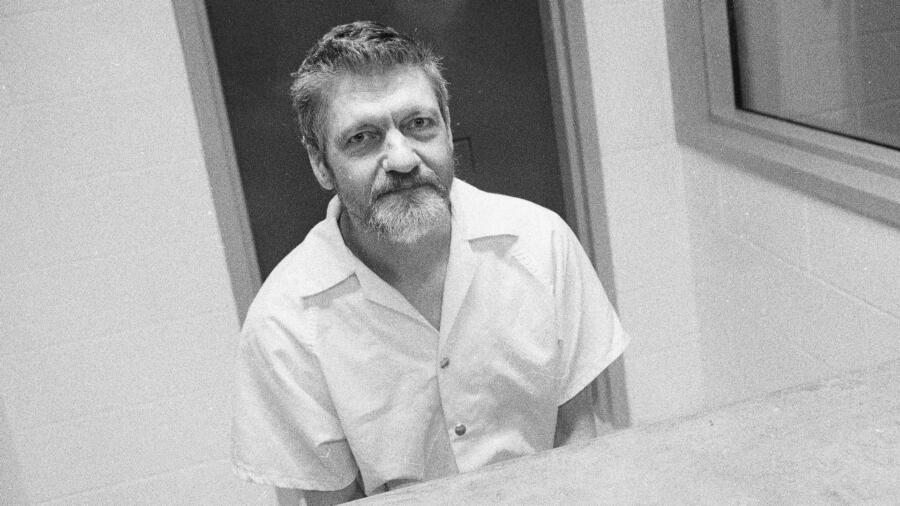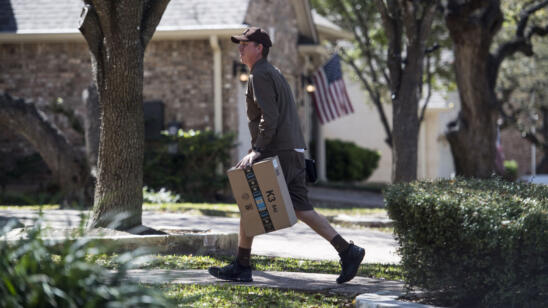Between 1978 and 1995, Theodore “Ted” Kaczynski mailed or hand-delivered homemade bombs that killed three people and injured 23 others. He would come to be known as the Unabomber, named after two of his intended targets—Chicago University and an American Airlines flight. (The FBI used the case identifier UNABOM for University and Airline Bomber.)
Kaczynski created his homemade bombs in a tiny, primitive shack nestled in the remote Lincoln, Montana woods on land sold to him by the Gehring family. Jaime Gehring was born in 1980, just two years after Kaczynski’s first bomb exploded. Along with her parents and younger sister, she grew up next to Kaczynski, unaware for the entirety of her childhood of the evil that lurked just beyond the trees.
Gehring spoke to A&E True Crime about her new memoir, Madman In the Woods, and how growing up next to an infamous criminal is the cocktail party fodder no one really wants.
You write about a dichotomy in Kaczynski’s personality—he was a cold-blooded killer but at the same time, when you were a child, gave you handmade gifts like painted rocks. Was that hard to make sense of?
It was one of the most difficult things to reconcile as an adult, to try to understand how in one moment he could be creating a gift for me and literally in the next, killing someone. In speaking with his brother David Kaczynski, it was almost as if [Ted] was truly two different people. [He was diagnosed a paranoid schizophrenic.]
Did you keep any of those trinkets from Kaczynski?
The painted rocks he gave to me, my dad ended up burying. They’re in the property for eternity, which actually seems fitting.
Was there a particular moment from your childhood living next to Kaczynski that still gives you the creeps today?
I have multiple core memories that were alarming to me. There were times when [Kaczynski] would come and knock on our door and ask for the time. [Kaczynski’s shack didn’t have electricity or running water.]
[Watch episodes of American Justice in the A&E App.]
In those early years, I wasn’t too scared of Ted, but as the years progressed and his appearance changed, it just felt different. I would hide in the closet until he would leave.
How did his appearance change over the years?
In the early years when he first came to Lincoln, he smelled like a wild man. His hair would stick up all over the place. But as the years progressed—the holes in his clothing, the soot on his face, the dirt underneath his fingernails—everything was completely in disorder. It was very apparent that he really lost the desire to look anything like that [University of California] Berkeley professor that first came to Lincoln.
Did you wonder what your neighbor was doing in the woods, especially in such a secluded area alone?
Yes, that was such a motivating part of my book, reliving those childhood memories asking, ‘What is Ted doing? Why is he here? Who is he?’
He was so quiet about any type of personal questions. He would always deflect or give very vague answers. Our family just kind of assumed he had a troubled past and didn’t want to talk about it, and we gave him that space.
You came to suspect he poisoned your dog, Wiley. And one day, he pointed a gun at your stepmother and young sister, without them knowing, when they were in the woods—a fact you only learned about later when his journals were released. Do you feel like your family narrowly escaped being among his victims?
I do feel lucky. There were nights while writing this book [when] I would just start crying when I would see how he would talk about his victims as experiments. He was so full of hate and so motivated by revenge. The words he wrote [in his manifesto] were so terrifying because it seemed like, at that point, when he was in the midst of his reign of terror, he was so indiscriminate about his victims.
I feel lucky and so grateful for the FBI agents who finally solved the case because who knows what would have happened.
As Ted’s bombings began to make the news, when was it that your family begin to realize that the man living next to you might be the Unabomber?
The pieces started clicking for my father just about a month before Ted was arrested. That’s when [the FBI] approached my father. They told him they were looking into Kaczynski first for writing some threatening letters and then that they suspected he was the Unabomber.
My dad was shocked. Initially, he was like, ‘Oh no, no way! That’s just Teddy. He’s an odd guy, but there’s no way could he be the Unabomber.’
Did your dad tell you at that point?
The FBI asked my dad not to say anything to anyone, even my stepmom. He had to keep this intel completely private…and he took it so seriously.
That’s asking a lot of him, to continue to live there and act normal next to a guy who’s a homicidal maniac.
Yeah. And I never really thought about it in that light until I was writing it, but you’re a hundred percent correct. The FBI asked my dad to videotape the terrain around Kaczynski’s home in preparation for Kaczynski’s arrest and so thinking back on that…how terrifying.
My dad was former military, so I think that probably helped prepare him for something like that. Even though he was scared, he said there was no other choice for him. If it wasn’t my dad around Ted’s property, Ted would have suspected something. He was always looking. He had a lookout tree. He was always looking for outsiders.
True crime is often looked at as entertainment, but you lived it. How does your experience shape how you feel about other people’s fascination with infamous criminals like Kaczynski?
I feel like there is a desire to understand the minds of these murderers. It’s almost empowering, in a way, for people to have that knowledge. I don’t think there’s anything wrong with that. That’s how I felt—the more I understood, the more at peace I felt about it.
How do you think your childhood has shaped the way you view others now?
I definitely look at the world in a bit of a different lens. I still think the best of people until there’s a reason not to. But it definitely reminded me to trust my own gut instincts.
As a child there were moments when I thought something was wrong and it was dismissed because I had an overactive imagination or I was just a kid. When this all came out and I saw the concrete evidence in front of me, it was a reminder to trust my instincts, and trust kids’ instincts.
Related Features:
A Ret. Bomb Technician Explains Package Bombs and Trip Wires Used in Austin Bombings


